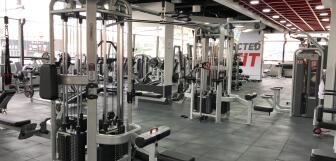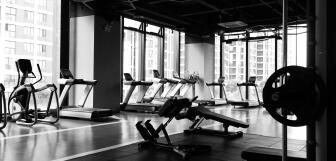Gym Startup Costs - How Much Does It Cost to Open a Gym?
Then there are the many extra features the best gyms need to ensure members get the best value for their monthly fees and to keep them coming back.
There are advantages and drawbacks associated with running a gym. In this blog, we'll focus on getting you out of the starting blocks. Read on to find out:
- What you need to think about when choosing your premises
- Choosing and budgeting for your exercise machines
- Expenses involved in opening a gym
- How to get started with marketing your gym
How much does it cost to buy a gym?
Finding the right premises is a critical step for any new gym owner. The size, location, and condition of your business's physical space will play a key role in determining what activities you can offer, how you can expand your services, and how members will feel in your space.
Your starting budget will significantly determine your options when you open a gym. Given the cost of gym equipment and the real estate market, you'll need a large budget if you want to own your gym space.
Renting or buying when opening a gym
Deciding whether to rent or buy can help you begin your financial planning. Renting brings the benefit of lowering your initial costs and the drawback of increasing your monthly costs. The recurring costs associated with renting will impact the business's overall profitability.
Despite this, many businesses open by renting their location and flourish by spending their opening budget on quality stock, equipment, and marketing.
Regarding prices, both renters and buyers can expect similar factors to influence prices. So when looking for a good space, you'll want to weigh the potential of the gym against the following:
- Location. Depending on the urban or rural area you find, the value of the property will vary greatly.
- Size of the gym space. You won't be surprised to see a larger gym will cost more than a smaller one. If opening your first gym, you'll need to start small and look to expand, either by renovating the space you have or by moving.
- Property condition. The condition of the property can significantly influence expenses. For those running on a tight budget, improving a run-down property can save money and create an opportunity to shape your gym to suit your needs, brand, and personality.
- Accessibility to transportation and parking facilities. Gym owners need to think hard about the people they hope will come to the gym. If you expect many members to be drivers, where can they park before a visit? If not, can people catch the bus to come by, or will you be near a large residential area you hope to attract to your business? Locations with good accessibility may cost a little bit more.
- Local amenities and services nearby. A gym near shops, parks, or entertainment spots will receive a boost in membership from passing traffic. But, as with access, amenities raise the cost of property in an area.
You'll also need to think about the following:
- Zoning regulations in the area. Given the nature of a fitness business, its operation brings both hygiene and health and safety risks. Particularly for instance, if it builds a swimming pool as well.
- Availability of special permits/licenses required for gym ownership. The last thing any business wants is to invest in a property only to be unable to use it due to difficulty over a business license or other legal fees that need to be paid.
Budgeting for your business: how much do exercise machines cost?
Even a personal gym costs tens of thousands of dollars. So you can expect equipment costs to make up most of your budget. It is this equipment, after all, that makes gym memberships worth the money. There simply isn't a substitute for the top-quality, commercial-grade machines that gyms can offer.
However, this also means that this part of your budget needs to be well-invested. Which machines will you need? How many of each should you buy? How many can you fit into your space safely? There are plenty of questions like these you'll need to have answers to before you make your purchases.
Conducting market research offers gyms the chance to understand the preferences of future members before opening, which allows them to accommodate their tastes. Research is something any prospective gym owner should do to avoid losing members by not offering the services they want.
To help get an idea of which units are typically popular, here's a little more detail on the more recognizable gym equipment, their usual price, and what they offer:
Treadmills
On Buy's study of the most popular workout machines found the treadmill was comfortably the most sought-out gym equipment on search engines. The UK study found treadmills were searched for just short of 300,000 times per month, sprinting over the line 200,000 searches ahead of dumbells, the next most popular equipment.
Most gyms purchase multiple treadmills, as so many people go to gyms to use them. Your members won't want to wait to jump on and start running. However, treadmills cost several thousand dollars each, so a row of treadmills will set you back somewhere in the region of 10k.
Dumbells
Coming in second with 90,000 searches per month, a rack of dumbells with light, middle-weight, and heavy dumbells will cost somewhere between 1-2 thousand pounds and is only slightly cheaper than a treadmill. However, your gym would not require more than a couple of racks to allow everyone that wants to work their biceps until they're sore.
Exercise bikes and rowing machines
Third and fourth on the list, both exercise bikes and rowing machines of gymnasium quality will likely set you back another few thousand pounds. While you may not require a row, you'll want several available for members to use.
As with treadmills, purchasing cheaper equipment is possible, but it would mean users won't have the advantages of the best equipment, with multiple settings, emergency stops, heart monitors, and statistics on workout sessions.
Other equipment your gym could offer
Given the different types of fitness and the many muscles people like to work on, a commercial gym can use the space on offer cheaply, with medicine balls, yoga mats, and step-up boxes, or with more complex workout machines with benchpresses or even massagers for cool-down sessions.
Here are a few more devices often seen at gyms:
- Step machine
- Punching bag
- Barbell
- Resistance bands
- Cable machine
- Leg press
- Machine bicep curl
- Tricep curl
How to get started with marketing your gym
Marketing efforts can feel like pushing a boulder up a hill, only to watch it roll back down: it's a lot of work, and you don't always know when you're making progress. But it's important, especially for new businesses.
Once established, some businesses put less energy into marketing and can expect to continue acquiring new customers through word-of-mouth, a much-loved and cost-effective method of marketing. But every business starts from scratch, and you'll need to factor marketing into your startup costs.
Your gym business plan could involve a budget for leafleting, which is relatively inexpensive (although time-consuming). Alternatively, you can run advertisements in newspapers, magazines, and local radio. However, results may vary depending on the readership/listenership of the local media.
Marketing your gym online
Thanks to the amount of commerce and traffic that passes over the internet, social media and online marketing have become one of the more significant areas you can market your business. The big advantage of building a social media presence is that it provides an excellent means of communicating information about your business to potential customers at no cost.
Focusing on social media advertising allows you to keep your marketing budget lower and focus on other gym startup costs, such as buying equipment. However, even if you post regularly, your social media account will start with very few followers. As such, you may want to use paid social media and online advertising to help raise the profile of your account.
Other expenses aspiring gym owners can expect
Once your gym is open, even with the finest fitness centre for miles around, members will want more. Gymnasiums are a focal point for health-focused people looking for expertise in personal training and fitness.
To provide expertise, gyms need to hire personal trainers that bring with them knowledge of fitness, sports medicine, training regimes, and lots of other kinds of valuable knowledge. Offering a fitness instructor for your members brings an attractive service to your gym. A personal trainer on your team can run fitness classes, offer first aid when required, and give expert advice to those dropping in for a workout.
You'll want to hire several personal trainers, give them employee uniforms, and train members of your team to build expertise within the business and offer your members the first-class workouts they deserve.
You may want to look into courses from institutions such as the International Sports Sciences Association. A qualification from a respected institution like this will make sure your team's advice is respected and sought out by your members.
Licensing
The precise legal certificates and documents needed to open a gym will vary depending on where you are, but you'll be required to take similar steps in each case.
You'll require a strong gym insurance package, as there is a likelihood some members will be hurt while exercising. Many insurers offer gym-focused packages that offer general liability insurance and professional liability, which protects against claims of property damage and malpractice. For smaller, new gyms, you can expect insurance costs to be comfortably below £800.
Health and safety permits also vary from place to place, but your members and local authority will want reassurance that your building, utilities, and equipment are all safe to use. Likewise, having a qualified first aider on site at all times when the gym is open to the public is a must, which may mean sending team members off to earn the relevant qualification.
Registering your business
In addition to these steps, you'll need to register your business in all the usual ways (for businesses in your location). Employee Identification Number (EIN) registration allows you to hire staff legally while being a way of confirming your business as an entity.
For many people, especially those excited to get started with their gyms, the legal loopholes involved in opening a gym and entering the fitness industry can be stressful. Epos Now has published many guides to help with these, including this guide to gym licenses and permit costs.
Planning for recurring costs
Any potential business owner ought to create a business plan as a first step. A business plan helps people foresee how much money they're going to need and what it will need to be spent on until the business has enough customers to become self-sustaining.
While gymnasiums may have fewer recurring expenses to factor in, given the high initial investment and the time it takes to accrue high gym membership numbers, predicting maintenance costs can help management teams understand member targets, set pricing, and keep enough of the initial budget aside to prevent gyms from going under before they get off the ground.
Recurring expenses for gym managers to keep in mind
- Utility bills, including electricity, water, heating, and air conditioning
- Payroll for both personal trainers, cleaners and maintenance staff, and admin roles (you may have staff carry out each of these roles during their shifts or separate team members for each role)
- Licensing and training, as many of your required licenses will need renewing every year, and training your team can cost a lot of money
- Unexpected repair work for machine malfunction or property damage (You can always expect some of this)
If you make projections in your business plan, you may have a rough idea of how much you expect these costs to come to on a monthly basis. You can then set target membership numbers and, by multiplying this figure with your monthly fees, calculate how much monthly income to expect should you hit your targets. For instance:
100 members x £20 = £2000
150 members x £20 = £3000
If you aim to have one hundred members at your gym by the end of your first month, each paying twenty dollars, you'll be bringing in two thousand dollars. For every fifty new members you acquire, you'll have one thousand dollars per month.
You may look at these projections and recognize that you'll need more money to meet your expenses, and your starting budget cannot carry losses past the first few months. In this case, you might set your member's fees at £30 instead.
Having a business plan is useful because it allows you to project ahead of time and correct mistakes before they happen. For instance, raising membership fees just after your first members join could cause many members to leave.
Invest in reliable gym management software
In the build-up to your opening day and every day after, staying organized and keeping records of your members and sales makes running a successful gym business much easier. POS (point-of-sale) tills have been honed over the years to help businesses of every size and shape operate in a simpler, more straightforward manner.
These days, companies don’t just use tills to process transactions; they are the central hub of the business, keeping track of inventory, customer data, and sales data, and can make all operations more efficient.
When opening a gym, membership numbers will be low and will need time until it can fund your payroll. However, using a point-of-sale system allows you to reduce staffing by running your business more efficiently. Completing inventory, transactions, and cash management in less time. You can then focus on customer acquisition and relations.
A POS can be bought upfront or paid for in instalments to work around your budget, as the best providers understand the different needs and restrictions young businesses face.
For the best POS systems, try Epos Now
You may think once your doors are open, running your gym should be much easier, and that might be the case, but only if you've got a top-of-the-range point-of-sale system. Epos Now's gym POS software is designed to take care of businesses of all kinds by staying on top of customer relations, employees, inventory, sales, accounts, and much more.
- Choose from hundreds of apps and integrable partner programs to run accounting, marketing, and sales functions in a way that suits you
- Offer members a range of options, and know who's who with member cards and easy-access customer accounts that document your history with every customer
- Use Epos Now payment processing to incorporate card payments into your POS with a simpler, easier style
- Manage your business stress-free with cloud technology that gives you instant access to the latest business data from anywhere in the world!
Get in touch with our team to speak with an expert about the needs of your business and how an Epos Now POS system can help you get your gym in shape.
Still wondering how to open a gym? Want to read more helpful guides on business and commerce? Take a look at some more of our handy articles:
- What is hospitality marketing?
- How to choose a business structure?
- Cost saving ideas for the workplace
- How to reduce labour costs




